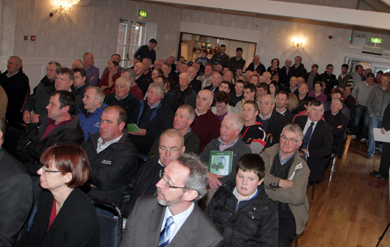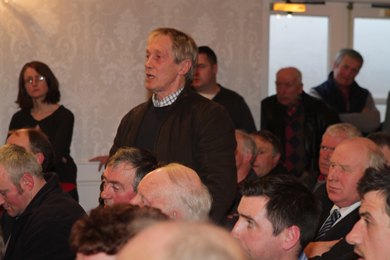 At the Hilltown meeting were DARD Minister Michele O’Neill with South Down Sinn Féin MLA’s and Councillors.[/caption]
Speaking as a guest speaker at a sometimes emotionally charged public meeting organised by Sinn Féin to discuss a range of rural issues and the severe weather impacts on farming, the Minister addressed the meeting covering the key problems the farming community were facing and how her department could help.
There was no doubt that the Minister was totally committed to helping the farming community in its hour of need but in the discussions after her presentations she explained she was constrained, like all ministers, by public audit committees and EU finding rules which made direct crisis payments to farmers more difficult administratively to achieve. She added that DARD’s actions needed to stand up to scrutiny.
In recent weeks Minister O’Neill has travelled over Northern Ireland talking to many hill farmers and has seen first hand the great difficulties that they face in getting back on their feet. She said during her address: “I have met many farmers who were very stressed and were crying. I have no doubt how difficult this has been for farmers and will do all in my power to assist.”
At the meeting, which was attended by over 200 people, the recent snow storm and CAP reform were the main topics of discussion. Minister O’Neill said: “South Down was one of the main areas to have been affected by the recent severe weather. The collection and disposal scheme, which closes this Friday, has proven to have been of great assistance with hundreds of farms in the South Down area having had livestock collected.
[caption id="attachment_38141" align="alignright" width="390"]
At the Hilltown meeting were DARD Minister Michele O’Neill with South Down Sinn Féin MLA’s and Councillors.[/caption]
Speaking as a guest speaker at a sometimes emotionally charged public meeting organised by Sinn Féin to discuss a range of rural issues and the severe weather impacts on farming, the Minister addressed the meeting covering the key problems the farming community were facing and how her department could help.
There was no doubt that the Minister was totally committed to helping the farming community in its hour of need but in the discussions after her presentations she explained she was constrained, like all ministers, by public audit committees and EU finding rules which made direct crisis payments to farmers more difficult administratively to achieve. She added that DARD’s actions needed to stand up to scrutiny.
In recent weeks Minister O’Neill has travelled over Northern Ireland talking to many hill farmers and has seen first hand the great difficulties that they face in getting back on their feet. She said during her address: “I have met many farmers who were very stressed and were crying. I have no doubt how difficult this has been for farmers and will do all in my power to assist.”
At the meeting, which was attended by over 200 people, the recent snow storm and CAP reform were the main topics of discussion. Minister O’Neill said: “South Down was one of the main areas to have been affected by the recent severe weather. The collection and disposal scheme, which closes this Friday, has proven to have been of great assistance with hundreds of farms in the South Down area having had livestock collected.
[caption id="attachment_38141" align="alignright" width="390"] A packed audience of South Down farmers ready to listen to DARD Minister Michele O’Neill.[/caption]
“The second element of the hardship measures introduced, proposals for which I will bring to the Executive in due course, will seek to ease the costs of livestock losses that have been sustained by farmers arising from the snow storm.
“The hardship scheme will be linked to the collection and disposal scheme and will be framed in light of the information gathered on the extent and nature of losses which we will build as farmers have stock removed and disposed of by the approved renderers. The details of the hardship scheme and how to apply will be made public as soon as possible. There will be a maximum of £6000 available to each farmer and this can be paid out by the end of June.”
The Minister reminded farmers who cannot meet the required stocking density between 1 April to 31 October as a result of Force Majeure associated with the recent severe weather, that they need to write and tell the Department at the earliest opportunity to highlight this is the case. She said: “The Department will accept letters and Force Majeure application forms, which are available on the DARD website or at DARD Direct Offices, up to but not beyond the 15 May which is the closing date for the Single Application Form. If farmers neglect to do this and, as a result, do not obtain an LFACA payment in 2014, it will then, in all probability, be too late to claim under Force Majeure provisions.
“It is therefore vital that farmers take action on this matter now and write to the Department or complete and return the form to explain why the stocking density has fallen below the required level.”
[caption id="attachment_38142" align="alignleft" width="390"]
A packed audience of South Down farmers ready to listen to DARD Minister Michele O’Neill.[/caption]
“The second element of the hardship measures introduced, proposals for which I will bring to the Executive in due course, will seek to ease the costs of livestock losses that have been sustained by farmers arising from the snow storm.
“The hardship scheme will be linked to the collection and disposal scheme and will be framed in light of the information gathered on the extent and nature of losses which we will build as farmers have stock removed and disposed of by the approved renderers. The details of the hardship scheme and how to apply will be made public as soon as possible. There will be a maximum of £6000 available to each farmer and this can be paid out by the end of June.”
The Minister reminded farmers who cannot meet the required stocking density between 1 April to 31 October as a result of Force Majeure associated with the recent severe weather, that they need to write and tell the Department at the earliest opportunity to highlight this is the case. She said: “The Department will accept letters and Force Majeure application forms, which are available on the DARD website or at DARD Direct Offices, up to but not beyond the 15 May which is the closing date for the Single Application Form. If farmers neglect to do this and, as a result, do not obtain an LFACA payment in 2014, it will then, in all probability, be too late to claim under Force Majeure provisions.
“It is therefore vital that farmers take action on this matter now and write to the Department or complete and return the form to explain why the stocking density has fallen below the required level.”
[caption id="attachment_38142" align="alignleft" width="390"] Farmer Alan Chambers was one of the many who raised questions with the DARD Minister.[/caption]
On CAP Reform the Minister said the key elements are now in place to enter the final stages of the negotiation process, where the Irish Presidency, the European Parliament and the EU Commission will enter the so-called trilogues in order to secure a final deal. She explained: “The key issues for me in the final three months of negotiations will be to ensure that we secure maximum regional flexibility to decide on the policy options that best suit the balance of our local interests.
“I will also want to ensure that we have the ability to implement a gradual and orderly transition towards flat rate, area based payments that will allow farm businesses sufficient time to adjust to the undoubted challenges that this will bring. And I will want to ensure the greening proposals are suitable to a region where farming is predominantly grassland based.
“I will certainly continue to use every available avenue both at official and Ministerial level in order to press our case on these and the myriad other issues that form part of this extremely complex support framework.”
The Minister explained the need for a healthy agri-food system and said if one area was in difficulties it needed to be addressed. She also discussed her recent visit to China to explore new markets and said that there was huge potential in this market and and it will be explored further.
After the meeting the Minister visited a number of information exhibits on display, including Countryside Services Ltd and Down Rural Area Partnership, and spoke to many farmers directly answering their questions.
Farmer Alan Chambers was one of the many who raised questions with the DARD Minister.[/caption]
On CAP Reform the Minister said the key elements are now in place to enter the final stages of the negotiation process, where the Irish Presidency, the European Parliament and the EU Commission will enter the so-called trilogues in order to secure a final deal. She explained: “The key issues for me in the final three months of negotiations will be to ensure that we secure maximum regional flexibility to decide on the policy options that best suit the balance of our local interests.
“I will also want to ensure that we have the ability to implement a gradual and orderly transition towards flat rate, area based payments that will allow farm businesses sufficient time to adjust to the undoubted challenges that this will bring. And I will want to ensure the greening proposals are suitable to a region where farming is predominantly grassland based.
“I will certainly continue to use every available avenue both at official and Ministerial level in order to press our case on these and the myriad other issues that form part of this extremely complex support framework.”
The Minister explained the need for a healthy agri-food system and said if one area was in difficulties it needed to be addressed. She also discussed her recent visit to China to explore new markets and said that there was huge potential in this market and and it will be explored further.
After the meeting the Minister visited a number of information exhibits on display, including Countryside Services Ltd and Down Rural Area Partnership, and spoke to many farmers directly answering their questions.
Issues Raised by Farmers in the Audience
Questions and comments were invited and Caitriona Ruane MLA chaired the discussion. The main issues arose from hill farmers who had taken the brunt of the severe weather. * “we have lost much stock and property and the farming community is under severe pressure. We are the backbone of the community.” * “those receiving the emergency benefits should be farmers who are working the land and not those who are letting it out to conacre.” * “we are still finding dead sheep and lambs after three weeks and it is good to know that we will still get some relief even after the closing date this Friday of the hardship scheme. Many farmers lost their breeding stock in the bad weather. And this has been the worst year for a long time as farmers had already been feeding their sheep meal at great expense. Some farmers may give up if the weather does not ease up. Prices of feed are going through the roof.” * “each year I take a stand at the annual Irish ploughing championships and this year they are in Wexford. It helps business and it is hard to afford the cost of the stand. Can this be supported?” * “Surely if our cultural heritage is threatened the EU should be helping us in an emergency? We need to repair walls, fences, sheds and build up our stocks again. We’re just devasted. We need to protect our rural way of life.” * “the reality is that stock will continue to die in weeks to come as a result of this extreme weather and the cut of point for hardship payments is this week. I recognise that the MInister is offering a fair hearing to any farmer who can present his case after this date.” * “I could not get my Single farm payment as I had not removed whins from my fields. During the blizzards when sheep went to shelter near walls they were suffocated in snow drifts, whereas they could have sheltered in the whins for protection.” * “there needs too to be assistance for ensuring that the stone walls are properly maintained in the hills.”***
At the end of the discussion, there was a show of hands and it was agreed to invite Martina Anderson MEP to a meeting to talk to the farmers in the near future. On closing the meeting, Catriona Ruane MLA said that if they needed further assistance they could contact the local DARD office or the Sinn Féin offices in Castlewellan and Warrenpoint. Castlewellan – 028 437 70185. Warrenpoint – 028 417 54283. ]]>























